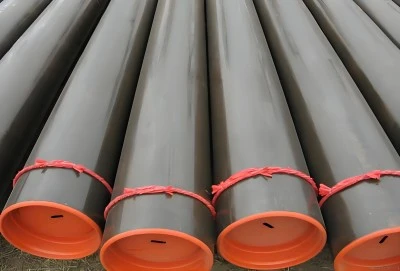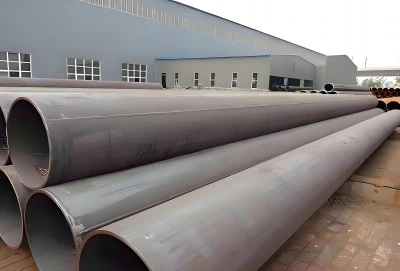Water transmission is a critical aspect of modern infrastructure, requiring reliable and durable piping solutions. While API 5L welded pipes are primarily associated with the oil and gas industry, their application in water transmission systems has gained attention due to their robust properties and cost-effectiveness.
|
|
|
What are the key requirements for pipes used in water transmission?
Water transmission pipelines are essential for delivering clean water to communities, industries, and agricultural areas. To ensure the safety, efficiency, and longevity of these systems, pipes used in water transmission must meet several key requirements:
- Strength and Durability: Pipes must withstand various pressures, including internal water pressure, external soil loads, and potential water hammer effects. They should maintain their structural integrity over long periods, often spanning several decades.
- Corrosion Resistance: Given the constant exposure to water and potential chemical treatments, pipes must resist corrosion to prevent leaks, contamination, and premature failure.
- Water Quality Preservation: The pipe material should not leach harmful substances into the water, ensuring the transported water remains safe for consumption and use.
- Hydraulic Efficiency: Smooth internal surfaces are crucial for minimizing friction losses and maintaining efficient water flow over long distances.
- Flexibility: Pipes should have some degree of flexibility to accommodate ground movements, thermal expansion, and contraction without compromising their structural integrity.
- Joint Integrity: Robust and reliable joining methods are essential to prevent leaks and maintain system integrity throughout the pipeline's lifespan.
- Cost-Effectiveness: While meeting all technical requirements, the piping solution should also be economically viable for large-scale infrastructure projects.
These requirements ensure that water transmission systems can operate safely, efficiently, and reliably over extended periods, often in challenging environmental conditions.
How does API 5L welded pipe perform in water pipeline applications?
API 5L welded pipes, originally designed for oil and gas transportation, have shown promising performance in water transmission applications. Let's examine how these pipes measure up against the key requirements for water pipelines:
- Strength and Durability: API 5L welded pipes are known for their high strength-to-weight ratio, making them capable of withstanding significant internal pressures and external loads. The various grades available (e.g., X42, X52, X60) allow engineers to select the appropriate strength level for specific project requirements.
- Corrosion Resistance: While not inherently corrosion-resistant, these pipes can be effectively protected against corrosion through appropriate coatings and linings. When properly treated, these pipes can offer excellent long-term performance in water transmission systems.
- Water Quality Preservation: Steel pipes, including API 5L pipes, are generally considered safe for potable water transmission when properly coated or lined. They do not typically leach harmful substances into the water, maintaining water quality throughout the distribution network.
- Hydraulic Efficiency: Their smooth internal surface, especially when lined with materials like cement mortar or epoxy, provides excellent hydraulic efficiency. This smooth surface minimizes friction losses, allowing for efficient water transport over long distances.
- Flexibility: While not as flexible as some plastic pipe options, API 5L pipes offer sufficient flexibility to accommodate moderate ground movements and thermal expansion. Proper design and installation techniques can further enhance their ability to withstand environmental stresses.
- Joint Integrity: API 5L welded pipes can be joined using various methods, including welding, mechanical couplings, and flanged connections. These joining techniques, when properly executed, provide robust and leak-resistant joints suitable for water transmission applications.
- Cost-Effectiveness: Their widespread availability, combined with their durability and long service life, often makes them a cost-effective choice for large-scale water transmission projects. The ability to use thinner-walled pipes due to their high strength can also lead to material cost savings.
The performance of API 5L welded pipes in water pipeline applications has been demonstrated in numerous projects worldwide. For example, a study conducted on the use of API 5L X70 pipes for water transmission in Saudi Arabia showed excellent results in terms of strength, durability, and overall performance.
What coatings and linings are needed to prevent corrosion in water transport?
While API 5L welded pipes offer excellent mechanical properties, they require proper protection against corrosion to ensure long-term performance in water transmission applications. Various coatings and linings are employed to create a barrier between the steel pipe and the water, effectively preventing corrosion and extending the pipeline's service life. Some of the most common protective measures include:
- External Coatings:
- Fusion Bonded Epoxy (FBE): A highly effective, single-layer coating that provides excellent corrosion protection and adhesion to steel.
- Three-Layer Polyethylene (3LPE) or Polypropylene (3LPP): These systems consist of an epoxy primer, adhesive layer, and a top coat of polyethylene or polypropylene, offering superior protection against mechanical damage and corrosion.
- Coal Tar Enamel: Although less common in modern applications, it still provides good corrosion protection for buried pipelines.
- Internal Linings:
- Cement Mortar Lining: A popular choice for water pipelines, providing corrosion protection and improving hydraulic efficiency.
- Epoxy Lining: Offers excellent corrosion resistance and is particularly suitable for aggressive water conditions.
- Polyurethane Lining: Provides good protection against corrosion and abrasion, suitable for various water qualities.
- Cathodic Protection: In addition to coatings and linings, cathodic protection systems are often employed to provide an extra layer of corrosion prevention. These systems can be either:
- Impressed Current Cathodic Protection (ICCP): Uses an external power source to apply a protective current to the pipeline.
- Sacrificial Anode Cathodic Protection: Utilizes sacrificial anodes that corrode preferentially, protecting the steel pipe.
The selection of appropriate coatings and linings depends on various factors, including water chemistry, soil conditions, operating temperatures, and installation methods. For instance, a study on the performance of different coating systems for API 5L X65 pipes in seawater applications found that multi-layer polyolefin coatings offered superior protection compared to single-layer systems.
It's important to note that proper surface preparation, application techniques, and quality control measures are crucial for ensuring the effectiveness of these protective systems. Regular inspections and maintenance are also essential to identify and address any coating or lining defects promptly, thereby maintaining the integrity of the water transmission system.
About LONGMA GROUP
API 5L pipes have proven to be a viable and effective solution for water transmission applications when properly protected against corrosion. Their high strength, durability, and cost-effectiveness make them an attractive option for large-scale water infrastructure projects. By combining the mechanical properties of API 5L pipes with appropriate coatings, linings, and cathodic protection systems, engineers can design water transmission pipelines that offer long-term reliability and performance.
As water scarcity and infrastructure challenges continue to grow globally, the use of API 5L pipes in water transmission systems represents an important contribution to sustainable water management. Their ability to transport large volumes of water efficiently over long distances can play a crucial role in addressing water distribution needs in both urban and rural areas.
If you're considering API 5L pipes for your next water transmission project or would like to learn more about our high-quality pipe solutions, we invite you to reach out to our team of experts. At LONGMA GROUP, we're committed to providing top-tier API 5L welded pipes that meet the highest standards of quality and performance. Contact us today at info@longma-group.com to discuss how we can support your water infrastructure needs and contribute to building reliable, long-lasting water transmission systems.














